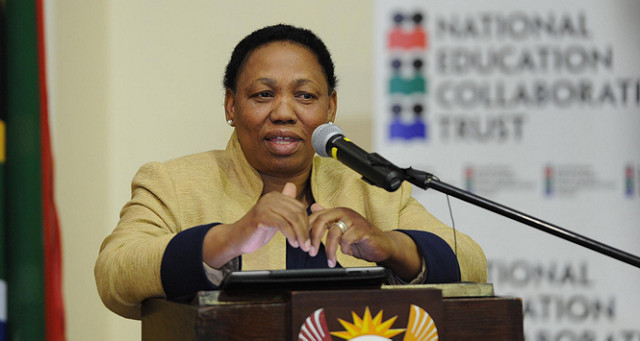Inside Education
Basic Education Minister Angie Motshekga on Wednesday tabled her department’s budget where she spoke of budget cuts, funding for infrastructure and the change in current curricula.
The overall 2018/19 budget allocation for the Department of Basic Education is just under R23 billion, 3% lower than the previous year.
Motshekga said her department only received a one percent increase over the previous financial year’s total allocation.
“In inflation-adjusted terms, this means that we are seeing a decline in the overall budget allocation for the basic education sector,” she said.
Motshekga said the budget vote took place in the context of “financial constraints” which had led to a reduction in basic education sector funding.
“I must state upfront that budgetary constraints in the sector have rightfully attracted a lot of attention over the last year, largely because of the weak economic growth.
“The basic education sector, like most other service delivery areas, has had to reduce what it purchases,” she said.
However, despite the budgetary cuts, the administration budget has increased by 8.2% to about R450 million.
The grant for learners with severe learning disabilities receives R185.5 million, almost three times the R72 million allocation in the last financial year.
Infrastructure delivery, which continues to be funded through the Education Infrastructure Grant and the Accelerated Schools Infrastructure Delivery Initiative (ASIDI), will receive an allocation of R9.9 billion and R1.5 billion respectively. This is a decrease of 44.8% from the 2017/18 allocations.
Criticism came from Equal Education and Section 27, both non-governmental organisations, that have placed the department of basic education uder pressure to fix schools in South Africa and fix the norms that apply to all schools.
The norms are laws which requires school infrastructure to meet minimum Norms and Standards.
Amanda Rinquest, the Co-Head of Equal Education Eastern Cape, said the minister has made many excuses for failing to fix schools. Some of these excuses include budget cuts announced by National Treasury.
“It is crucial to bear in mind that neither provincial education departments nor the national DBE effectively spend the funds that are already available. In 2015, the Eastern Cape underspent its education infrastructure grant by R530-million. In 2017, the national DBE underspent its budget to build schools in the Eastern Cape (via the ASIDI programme) by R415-million,” said Rinquest.
Regarding department of basic education’s want to phase in a new-look curriculum on history over seven years, Motshekga said:
“We will phase it in, we will make the necessary adjustment but we will also take the paradigm – the paradigm can’t be a Eurocentric paradigm, which teaches about the French revolution only. They have to know about the French revolution but they have to also know about Haiti just to have an Afro-centric perspective about the rest of the world.”










